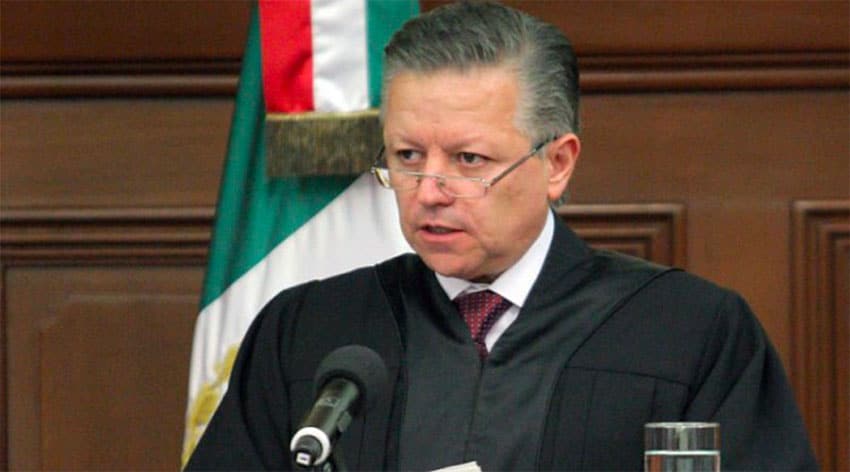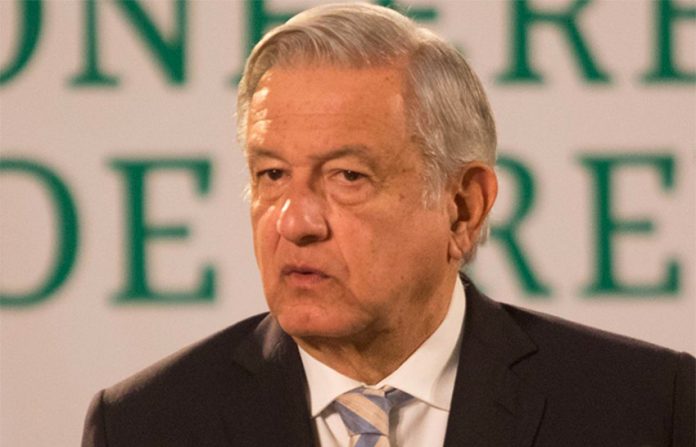President López Obrador threatened Wednesday to send a bill to Congress to change the constitution if a new electricity law that prioritizes the state-owned Federal Electricity Commission (CFE) over private companies is deemed unconstitutional.
The new Electricity Industry Law, which gives CFE-generated power priority on the national grid over that produced by private and renewable energy companies, took effect last week but was promptly suspended by a judge who ruled that it could harm competition and cause irreparable damage to the environment. A second judge ruled against the law on Tuesday in response to 11 injunction requests filed by private companies.
Speaking at his regular news conference, López Obrador said he was certain the law was not unconstitutional before indicating that he would seek to change the constitution if judges, including the Supreme Court, rule that it is.
“If judges, magistrates, justices determine it is unconstitutional and it can’t continue, I would send an initiative to reform the constitution because I cannot be an accomplice to robbery,” the president said, reaffirming his claim that the previous government, which ended a long-held state monopoly in the energy sector, allowed private and foreign companies to loot and steal.
The news agency Reuters reported that some lawyers do not believe that the law – which is seen as a barrier to investment and could trigger clashes with the United States – will be ruled unconstitutional if the government can provide sufficient guarantees to companies with existing energy sector investments in Mexico.
López Obrador didn’t indicate the exact nature of the constitutional change he would pursue but expressed confidence that his government would be able to enact one.
“What do we need? Two-thirds [of the Congress]? … It’s good that the elections are coming, … they [the opposition parties] are betting that we won’t get a majority in the Chamber of Deputies so they can continue maintaining privileges and continue maintaining the regime of corruption. But the people are wise,” he said.
The president’s Morena party and its allies the Social Encounter and Labor parties don’t currently have the votes among them to get the two-thirds majority required.
The president said he was unconcerned about the accumulation of rulings against the electricity law but reiterated that the judges that hand them down should be investigated.
“Public life has to be more and more public, transparency is a golden rule of democracy and there shouldn’t be untouchables. The president of Mexico has no immunity [from prosecution] now, he can be investigated for any crime, that didn’t happen before. If that’s the way it is with the president, why not with other public servants,” López Obrador said.
The president wrote last week to Supreme Court Chief Justice Arturo Zaldívar to ask that the judge who ruled against the electricity law be investigated.

López Obrador said Monday he had asked the Federal Judiciary Council (CJF) to determine whether the court in which the judge sits – an administrative court that specializes in economic competition, broadcasting and telecommunications matters – has the authority to suspend the law.
He said an investigation into the judge is necessary because there are “people, organizations and companies” that are close to the old political regime.
“[They] act based on their well-known economic and political interests [and] use corruption and influence peddling as their modus operandi,” López Obrador said.
He specifically cited Spanish energy firm Iberdrola, for which former president Felipe Calderón and his energy minister Georgina Kessel have worked.
Zaldívar responded to the president’s request for an investigation in his own letter, which the CJF made public on Monday afternoon, in which he made it clear that an investigation would only proceed if there was evidence of wrongdoing.
“As is appropriate in these cases your complaint will be sent to the relevant area of the Federal Judiciary Council so that an investigation is opened if there is evidence for that [to occur],” he wrote.
Zaldívar added that democracy and the rule of law are built on judges’ capacity to make decisions within “a framework of autonomy and independence.”
The chief justice told the president that it’s the job of the Federal Judiciary Council to ensure that judges can freely do that while making certain that they act in accordance with the law and with “honesty, honor and complete impartiality.”
“We will continue to fulfill this mandate,” Zaldívar concluded.
